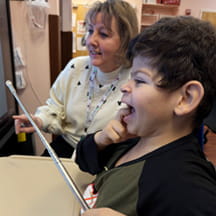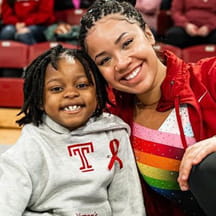During the Ching family's annual beach vacation in July 2019, Halle had the worst seizure of her life and stopped breathing. Her family called emergency services, and they airlifted her to MUSC Children's Hospital in Charleston, South Carolina.
She stayed there for nearly two weeks before returning home. But this most recent incident was not the first challenge Halle has faced.
Halle has a disease caused by a distinct change on the CANA1C gene, a disease so rare that no one else in the world has been found with the same genetic abnormality.
Finding a diagnosis
Halle was 2 months old when her poor muscle tone and lack of eye contact concerned her pediatrician. An EEG showed regular seizures, and a long road ahead.
The first step to a diagnosis came when a muscle biopsy at 10 months old determined Halle had a mitochondrial disease. After that, the search for answers stalled out.
"At some point we really kind of stopped caring because, I mean, it's great to know, but just getting her proper care became more important," says Cathy Stevens, Halle's mother. The possibility of answers became less elusive when Halle participated in a study for kids who had genetic abnormalities.
The study, conducted by the Undiagnosed Disease Network (UDN), did not reach any findings until Halle was nearly 9 years old. After a variety of tests and visits to the UDN site over many years, researchers discovered the genetic alteration, and the Ching family breathed a bit easier.
"That gave us a sense of relief that I don't think we would have had otherwise," says Stevens.
Managing care, adjusting expectations
While the family appreciated having some answers about their daughter's health, it took Halle's parents several years to accept her condition.
"It's hard to describe how difficult it is to see your child suffer," says Stevens. "I think there's a grieving process you go through-grieving the life you've imagined."
Even though Halle's diagnosis didn't play out the way they expected, Halle's family feels lucky to have her in their lives.
"We all just adore her and fight for her-fight with her," says Stevens.
Halle's care requires around-the-clock monitoring, and leaving the house is difficult, even with a part-time caretaker. Restaurants and grocery stores are too risky for her weak immune system, and lights can trigger seizures.
Care management is a central part of Halle's well-being. The Ferlauto Center for Complex Pediatric Care at Prisma Health Children's Hospital provided a turning point in Halle's care coordination and quality of life.
"Now, I don't feel like I'm missing some part of her care that I could be missing just because I'm not an expert," says Stevens. Halle's physician at the Ferlauto Center, Cady Williams, M.D., monitors Halle's condition, coordinates care with other specialists and streamlined her medicines and supplies.
Care during a pandemic
Halle is in the high-risk category for contracting COVID-19, meaning her family has been isolating since the onset of the crisis. This also means all of Halle's care has gone virtual. Physical and occupational therapies are now conducted via video chat, with exercises practiced through verbal instruction from a provider to her parents and caretaker.
"When it comes to the pandemic, I just keep telling my family this is going to change you forever, but it's not going to last forever," says Stevens.



